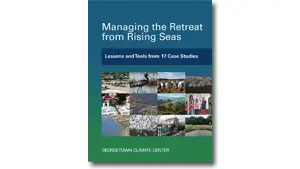 Managed retreat is the coordinated process of voluntarily and equitably relocating people, structures, and infrastructure away from vulnerable coastal areas in response to episodic or chronic threats to facilitate the transition of individual people, communities, and ecosystems (both species and habitats) inland.
Managed retreat is the coordinated process of voluntarily and equitably relocating people, structures, and infrastructure away from vulnerable coastal areas in response to episodic or chronic threats to facilitate the transition of individual people, communities, and ecosystems (both species and habitats) inland.
As seas continue to rise and disaster events and extreme weather increase in frequency and intensity, climate change is driving state and local policymakers to evaluate strategies to adapt to various risks affecting many communities. In addition to protection (e.g., hard shoreline armoring) and accommodation (e.g., elevating or flood-proofing structures) measures, coastal governments and communities are increasingly evaluating managed retreat, where appropriate, as a potential component of their comprehensive adaptation strategies.
The aim of managed retreat is to proactively move people, structures, and infrastructure out of harm’s way before disasters occur to maximize benefits and minimize costs for communities and ecosystems. For example, policymakers may maximize opportunities for flood and risk reduction by conserving wetlands and protecting habitat migration corridors and minimize the social, psychological, and economic costs of relocation by making investments in safer, affordable housing within existing communities.
This report is composed of 17 individual case studies listed below. Each one tells a different story about how states, local governments, and communities across the country are approaching questions about managed retreat. Together, the case studies highlight how different types of legal and policy tools are being considered and implemented across a range of jurisdictions — from urban, suburban, and rural to riverine and coastal — to help support new and ongoing discussions on the subject. These case studies are intended to provide transferable lessons and potential management practices for coastal state and local policymakers evaluating managed retreat as one part of a strategy to adapt to climate change on the coast.
- Blackwater National Wildlife Refuge, Maryland: Blackwater 2100
- State of Hawaii: Assessing the Feasibility and Implications of Managed Retreat Strategies for Vulnerable Coastal Areas in Hawaii
- Punta Gorda, Florida: Climate Adaptation and Comprehensive Plans and Updates
- Quinault Indian Nation, Washington: Taholah Village Relocation Master Plan
- Queens, New York: Resilient Edgemere Community Plan
- San Diego, California: ReWild Mission Bay
- Charlotte-Mecklenburg County, North Carolina: Floodplain Buyout Program
- City of Austin, Texas: Flood Risk Reduction Buyout Projects
- Harris County, Texas: Flood Control District Local Buyout Program
- New York City, New York: Land Acquisition and Flood Buyout Programs
- State of New Jersey: Blue Acres Buyout Program
- Woodbridge Township, New Jersey: Post-Hurricane Sandy Buyouts
- Long Beach, California: Los Cerritos Wetlands Restoration and Land Swap
- Hampton, New Hampshire: Community-Driven Climate Adaptation Planning Process
- State of Louisiana: Louisiana Strategic Adaptations for Future Environments (LA SAFE)
- Staten Island, New York: Oakwood Beach Buyout Committee and Program
- King County, Washington: Transfer of Development Rights Program
Managing the Retreat from Rising Seas is available on the Adaptation Clearinghouse website, a project of the Georgetown Climate Center and its partners.
Click here to view the resource.




